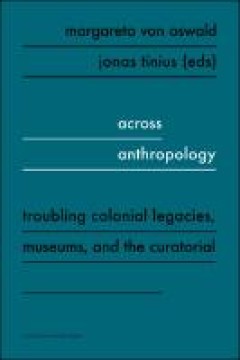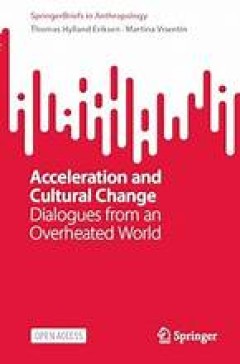Filter by

Across Anthropology
How can we rethink anthropology beyond itself? In this book, twenty-one artists, anthropologists, and curators grapple with how anthropology has been formulated, thought, and practised ‘elsewhere’ and ‘otherwise’. They do so by unfolding ethnographic case studies from Belgium, France, Germany, Italy, the Netherlands, and Poland – and through conversations that expand these geographies…
- Edition
- -
- ISBN/ISSN
- 9789462702189
- Collation
- oer.unej.ac.id
- Series Title
- -
- Call Number
- -

After Ethnos
For most of the twentieth century, anthropologists understood themselves as ethnographers. The art of anthropology was the fieldwork-based description of faraway others—of how social structures secretly organized the living-together of a given society, of how a people had endowed the world surrounding them with cultural meaning. While the poetics and politics of anthropology have changed dram…
- Edition
- -
- ISBN/ISSN
- 9781478090854
- Collation
- -
- Series Title
- -
- Call Number
- -

After Corporate Paternalism : Material Renovation and Social Change in the Ti…
In this ethnographic study of post-paternalist ruination and renovation, Christian Straube explores social change at the intersection of material decay and social disconnection in the former mine township Mpatamatu of Luanshya, one of the oldest mining towns on the Zambian Copperbelt. Touching on topics including industrial history, colonial town planning, social control and materiality, gender…
- Edition
- -
- ISBN/ISSN
- 9781800734159
- Collation
- -
- Series Title
- -
- Call Number
- -

Afropolitan Horizons : Essays toward a Literary Anthropology of Nigeria
Nigeria is a country shaped by internal diversity and transnational connections, past and present. Leading Nigerian writers from Chinua Achebe, Amos Tutuola and Wole Soyinka to Chimamanda Ngozi Adichie and Teju Cole have portrayed these Nigerian issues, and have also written about some of the momentous events in Nigerian history. Afropolitan Horizons discusses their work alongside other novelis…
- Edition
- -
- ISBN/ISSN
- 9781800732995
- Collation
- -
- Series Title
- -
- Call Number
- -

Afrikaners and the boundaries of faith in post-apartheid South Africa
This book examines the shifting moral and spiritual lives of white Afrikaners in South Africa after apartheid. The end of South Africa’s apartheid system of racial and spatial segregation sparked wide-reaching social change as social, cultural, spatial and racial boundaries were transgressed and transformed. This book investigates how Afrikaners have mediated the country’s shifting boundari…
- Edition
- -
- ISBN/ISSN
- 9781003185574
- Collation
- 195
- Series Title
- Routledge Contemporary South Africa
- Call Number
- -

Acceleration and Cultural Change
This open access book includes socio-anthropological and anthropo-sociological conversations between one of the world’s leading anthropologists, Thomas Hyland Eriksen, and a young scholar, using his groundbreaking "overheating" approach.This book includes socio-anthropological and anthropo-sociological conversations between one of the world’s leading anthropologists, Thomas Hyland Eriksen, …
- Edition
- -
- ISBN/ISSN
- 9783031330988
- Collation
- oer.unej.ac.id
- Series Title
- SpringerBriefs in Anthropology,
- Call Number
- -

A Bibliography of Chinese Language Materials on the People's Communes
A research tool for scholars studying modern China, particularly those focusing on the post-1949 communal system and economy. The work includes full bibliographic references to some 2,800 essay, articles, pamphlets, and other materials in Chinese taken from more than 130 publications, primarily from mainland. The entries are arranged are arranged topically with annotations. Includes a geographi…
- Edition
- -
- ISBN/ISSN
- -
- Collation
- -
- Series Title
- -
- Call Number
- -

»Failed« Migratory Adventures? Malian Men Facing Conditions Post Deportati…
The effects of the intra-African and European deportation regimes brought about since the European Union's externalization of its migration and development policy by transferring it to countries of sub-Saharan Africa remain largely understudied - especially their effects on people's everyday life after forced returns. Based on extensive field research, Susanne U. Schultz's book analyses the sup…
- Edition
- -
- ISBN/ISSN
- 9783839460092
- Collation
- oer.unej.ac.id
- Series Title
- Theater,
- Call Number
- -

A Translation of Lao-tzu’s Tao Te Ching and Wang Pi’s Commentary
During the Spring-Autumn period (722–420 BCE) and the time of the Warring States (480–222 CE), China was in great turmoil. Intellectuals and social reformers sifted through their wisdom and knowledge of China’s experiences up to then, attempting to find a solution to their situation. The Tao Te Ching, one of the foremost products of the era, is a metaphysical book, a source of the highest…
- Edition
- -
- ISBN/ISSN
- -
- Collation
- oer.unej.ac.id
- Series Title
- Michigan Monographs In Chinese Studies,
- Call Number
- -

Weirding Landscapes = Arctic Glacier Extinction and Monsters of the Anthropocene
This open access book investigates human-environment relations in the context of the anthropocenic Arctic. Through an archaeological and anthropological study of landscape, it wields “weirding” – a creative mode of engagement with the world – as a means of coming to terms with the stranger, experiential dimensions of a planet populated by diverse non-human entities often bearing monstro…
- Edition
- -
- ISBN/ISSN
- 9783031850165
- Collation
- XXVIII, 200 hlm; ill., lamp.,
- Series Title
- -
- Call Number
- -
 Computer Science, Information & General Works
Computer Science, Information & General Works  Philosophy & Psychology
Philosophy & Psychology  Religion
Religion  Social Sciences
Social Sciences  Language
Language  Pure Science
Pure Science  Applied Sciences
Applied Sciences  Art & Recreation
Art & Recreation  Literature
Literature  History & Geography
History & Geography